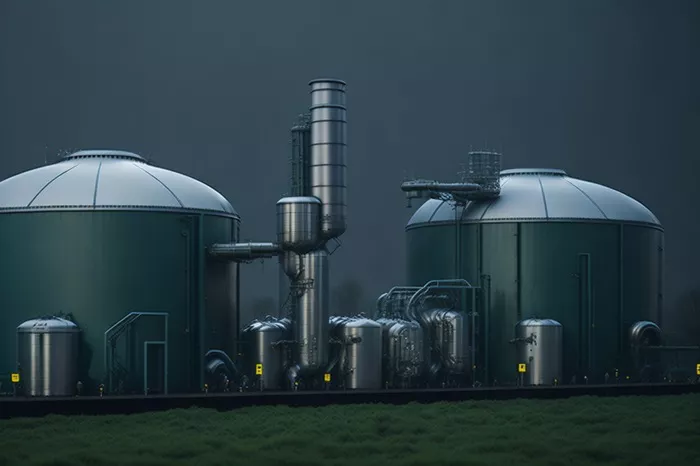As concerns over climate change intensify, societies around the globe are actively seeking sustainable and renewable energy sources to mitigate environmental impacts and secure a stable energy future. One promising contender in the renewable energy landscape is biogas. Derived from the anaerobic decomposition of organic matter, biogas stands out not only for its sustainability but also for its potential in reducing greenhouse gas emissions and providing a decentralized energy solution. This article delves deep into why biogas is considered renewable, its benefits, and its role in the future of energy production.
Understanding Biogas
What is Biogas?
Biogas is a type of biofuel that is naturally produced from the decomposition of organic waste. When organic matter such as animal manure, food scraps, or plant material breaks down in an environment absent of oxygen, it releases a blend of gases, primarily composed of methane (CH4) and carbon dioxide (CO2). This mixture, known as biogas, can be captured and used for various energy needs, including heating, electricity generation, and as vehicle fuel.
The Anaerobic Digestion Process
The production of biogas primarily occurs through a process called anaerobic digestion, which involves a series of biological and chemical reactions in a closed system. The main stages of anaerobic digestion include:
Hydrolysis: Complex organic materials are broken down into simpler soluble substances.
Acidogenesis: The hydrolyzed substances are converted into volatile fatty acids and alcohols.
Acetogenesis: The volatile fatty acids are further broken down into acetic acid, carbon dioxide, and hydrogen.
Methanogenesis: Microorganisms, known as methanogens, convert acetic acid, hydrogen, and carbon dioxide into biogas.
This process mimics natural decomposition but accelerates it, making biogas production a controlled and efficient process.
Why Biogas is Renewable
Source of Organic Material
The key factor that classifies biogas as renewable is its source material. Biogas is produced from organic waste that is continuously generated by human activities, agriculture, and industry. As long as there are organisms, plants, and animals, there will be waste that can be converted into biogas. This ongoing availability of feedstock ensures a perpetual cycle of production.
Carbon Neutrality
Biogas is considered carbon neutral because the carbon dioxide emitted during its combustion is equivalent to the carbon dioxide absorbed by the organic materials during their growth phase. This balance means that biogas does not contribute to an increase in atmospheric CO2 levels, unlike fossil fuels, which release carbon that has been locked underground for millions of years.
Sustainable Waste Management
Biogas production promotes sustainable waste management practices by converting organic waste into a valuable resource. This not only reduces the volume of waste sent to landfills but also minimizes the environmental impact of waste disposal methods, such as incineration and open dumping.
See also: Will Propane Work on a Natural Gas Stove?
Environmental Benefits of Biogas
Reduction in Greenhouse Gas Emissions
Methane, the primary component of biogas, is a potent greenhouse gas with a global warming potential approximately 28 times greater than that of carbon dioxide over a 100-year period. By capturing methane from organic waste and using it as a fuel, biogas production significantly reduces the emission of methane into the atmosphere.
Improved Air Quality
The use of biogas as a fuel can lead to improved air quality by replacing fossil fuels, which are major sources of air pollutants, including sulfur oxides, nitrogen oxides, and particulate matter. The combustion of biogas produces fewer harmful emissions, contributing to a cleaner and healthier environment.
Soil and Water Conservation
The byproduct of biogas production, known as digestate, is a nutrient-rich substance that can be used as a natural fertilizer. The application of digestate to agricultural fields enhances soil fertility and reduces the need for chemical fertilizers, which can have detrimental effects on soil and water quality.
Economic and Social Benefits
Energy Independence and Security
Biogas production enables communities to become more energy independent by reducing their reliance on imported fossil fuels. This decentralization of energy production enhances energy security and resilience, particularly in rural and remote areas.
Job Creation and Economic Development
The biogas industry has the potential to create a significant number of jobs, ranging from the construction and operation of biogas plants to the collection and processing of feedstock. This can stimulate economic development, particularly in rural areas where employment opportunities are often limited.
Rural Electrification
Biogas can play a crucial role in rural electrification by providing a reliable and sustainable source of electricity to communities that are not connected to the main power grid. This can improve the quality of life in rural areas and support economic activities.
Challenges and Solutions
Technical Challenges
The biogas industry faces several technical challenges, including the need for efficient and cost-effective technologies for feedstock collection, storage, and processing. Research and development in these areas are crucial to improving the viability and scalability of biogas production.
Policy and Regulatory Framework
The growth of the biogas industry depends on a supportive policy and regulatory framework that encourages investment and innovation. Governments can promote biogas production by providing incentives, streamlining regulations, and facilitating access to funding and technical support.
Public Awareness and Acceptance
Public awareness and acceptance of biogas as a renewable energy source are essential for the growth of the industry. Education and outreach programs can help dispel misconceptions about biogas and highlight its environmental and economic benefits.
Conclusion
Biogas stands as a promising and versatile renewable energy source with the potential to address multiple environmental, economic, and social challenges. Its renewable nature, coupled with its ability to reduce greenhouse gas emissions and promote sustainable waste management, positions biogas as a key player in the transition to a sustainable energy future. By overcoming the existing challenges and harnessing the full potential of biogas, societies can pave the way for a cleaner, greener, and more sustainable world.
Related topic:

